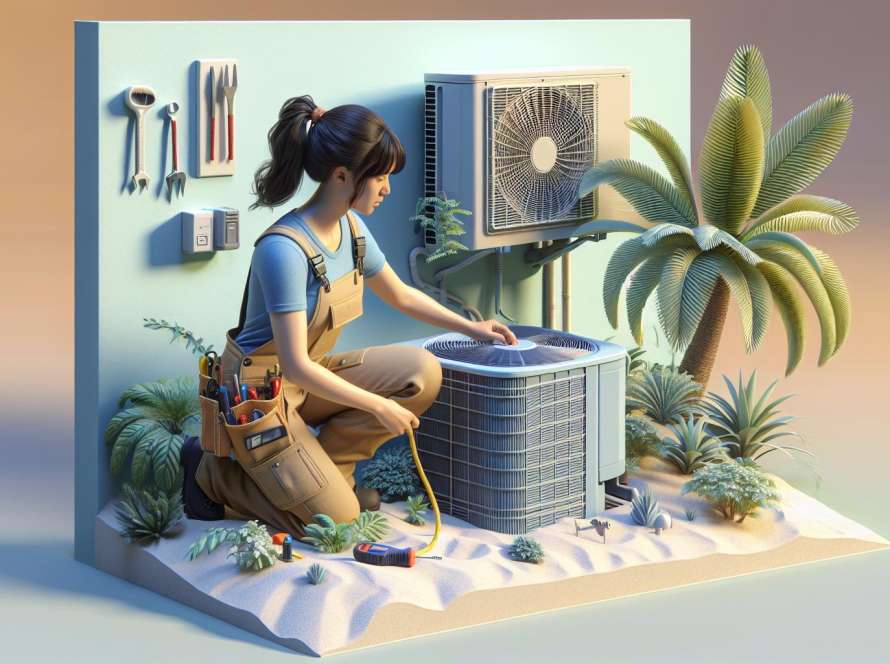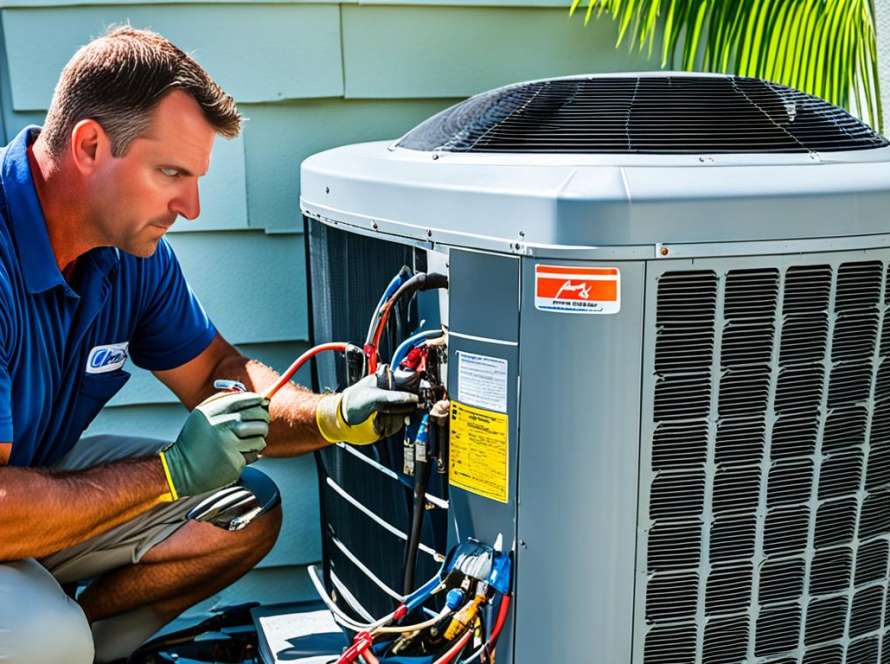So, you’re looking to optimize your AC performance for your Florida home, huh? Well, you’ve come to the right place. Here in the Sunshine State, keeping cool isn’t just a luxury – it’s a necessity. From scorching summers to balmy evenings, our AC units work overtime to maintain that perfect indoor climate. But fear not, we’ve got the inside scoop on how to ensure your AC system is running at its peak efficiency.
When it comes to AC performance, Florida’s unique climate presents its own set of challenges. Humidity levels can soar, putting extra strain on your cooling system. But fret not, we’ve got the tips and tricks to help you beat the heat and keep your AC running smoothly all year round. So, buckle up as we dive into the world of optimal AC performance for Florida homes.
Understanding Florida’s Climate
Florida’s climate is characterized by high temperatures and high humidity levels throughout the year. This unique climate presents specific challenges for air conditioning systems in homes across the state. Here, we dive into the key aspects of Florida’s climate that impact the performance of AC systems.
For Homeowners Exploring AC Efficiency:
- High Temperatures: Florida experiences hot and humid conditions for a significant part of the year, leading to increased demand on air conditioning systems to maintain a comfortable indoor environment.
- Humidity Levels: The state’s high humidity can make it feel even hotter, affecting how effectively AC units can cool and dehumidify indoor spaces.
- Year-Round Usage: Due to the consistently warm climate, AC systems in Florida homes often run frequently throughout the year, increasing wear and tear.
For Those Seeking Energy-Efficient Solutions:
- Energy Consumption: The need for round-the-clock AC use can result in higher energy bills for homeowners in Florida.
- Proper Insulation: Ensuring adequate insulation in homes is crucial to maintain cool indoor temperatures and reduce the workload on AC systems.
- Regular Maintenance: Performing routine maintenance on AC units is essential to optimize performance in Florida’s demanding climate.
- Sizing Considerations: AC units in Florida homes should be properly sized to handle the cooling load effectively in high-temperature environments.
- Moisture Control: Managing humidity levels within homes is as crucial as cooling, requiring efficient dehumidification systems in place.
- Seasonal Adjustments: HVAC professionals need to adapt strategies to address the varying demands of Florida’s climate throughout the year.
In Florida, understanding the nuances of the climate is key to ensuring optimal performance and efficiency of air conditioning systems in residential settings. By taking into account the specific challenges posed by the state’s climate, homeowners and HVAC professionals can work towards maintaining comfortable indoor environments while minimizing energy consumption and maximizing the lifespan of AC units.
Importance of Regular Maintenance

Regular maintenance is essential to ensure optimal performance of your AC system in Florida’s demanding climate. By staying proactive and addressing potential issues early on, you can avoid costly repairs and extend the lifespan of your unit. Let’s explore maintenance tips tailored for different experience levels:
For Beginners: Establishing a Routine
- Change filters every 1-3 months to maintain clean air quality and efficient airflow.
- Inspect outdoor unit for debris and clear any obstructions to prevent airflow restriction.
- Schedule professional tune-ups annually to detect and address any minor issues before they escalate.
For Intermediate Homeowners: Enhancing Efficiency
- Clean evaporator and condenser coils yearly to improve cooling efficiency.
- Check refrigerant levels and repair leaks promptly to avoid system malfunctions.
- Calibrate thermostat settings for optimal temperature control and to reduce energy consumption.
- Invest in a programmable thermostat for customized cooling schedules.
- Perform regular ductwork inspections to prevent leaks and ensure even airflow.
- Consider upgrading to energy-efficient models, such as variable-speed units, for enhanced performance and savings.
Remember, regular maintenance not only keeps your AC system running smoothly but also contributes to energy efficiency, lower utility bills, and a comfortable indoor environment throughout the year. Maintain your AC system proactively to enjoy its benefits for years to come.
Efficient Temperature Settings
For Beginners: Setting the Basics
- Start by programming your thermostat for comfort and energy savings.
- Keep the thermostat set at around 78°F when at home.
- Consider using a programmable thermostat to adjust temperatures automatically.
- Avoid drastic temperature changes by setting the thermostat a few degrees higher when away.
For Intermediate Homeowners: Optimizing Your System
- Understand the optimal temperature range for energy efficiency and comfort.
- Utilize smart thermostats for remote monitoring and control of your home’s temperature.
- Create customized schedules based on your daily routine to maximize efficiency.
- Use zoning systems to regulate temperatures in different areas of your home.
- Dive into HVAC system integration for temperature control and efficiency.
- Implement temperature setbacks during periods of extended absence to save energy.
- Explore geofencing technology to adjust temperatures based on your location.
- Invest in energy recovery ventilators for enhanced indoor air quality and efficiency.
| Statistic | Data |
|---|---|
| Average Florida temperature | 72°F to 92°F |
| Energy savings by setting thermostat back 7-10°F | Up to 10% annually |
| Potential energy savings by using a smart thermostat | Up to 23% on heating and cooling costs |
We know that setting the right temperature for your AC is essential for optimal performance. Let’s explore further ways to enhance your system’s efficiency and comfort.
Managing Humidity Levels
Humidity levels play a crucial role in maintaining optimal comfort and energy efficiency in Florida homes. Whether you’re a novice or an expert in AC maintenance, managing humidity levels is key to achieving peak performance. Here’s a breakdown based on your experience level:
For Beginners: Understanding the Basics
- Invest in a hygrometer to measure indoor humidity levels accurately.
- Keep humidity levels below 60% to prevent mold growth and ensure comfort.
- Use exhaust fans in kitchens and bathrooms to reduce humidity levels.
For Intermediate Homeowners: Enhancing Comfort and Efficiency
- Consider a dehumidifier to regulate humidity levels in humid climates like Florida.
- Maintain proper ventilation to allow moisture to escape and prevent condensation.
- Seal windows and doors to keep humid air from entering your home.
- Integrate humidity controls into your HVAC system for precise regulation.
- Use moisture barriers in crawl spaces and basements to prevent moisture intrusion.
- Invest in a whole-house ventilation system for balanced humidity levels.
By managing humidity levels effectively, we can improve indoor air quality, prevent mold growth, and enhance the overall performance of our AC systems in Florida homes.
Additional Tips for Optimal AC Performance

For Beginners: Simple Steps to Boost AC Efficiency
- Regular Maintenance: Schedule annual HVAC maintenance to keep your AC running smoothly.
- Temperature Settings: Set your thermostat to 78°F when you’re home and higher when you’re away.
- Air Filters: Check and replace air filters every 1-3 months to ensure proper airflow.
- Sealing Leaks: Seal any gaps around windows and doors to prevent cool air from escaping.
For Intermediate Users: Advanced Strategies for Improved Cooling
- Smart Thermostats: Invest in a programmable thermostat for better temperature control.
- Insulation: Add insulation to walls and attics to keep the cool air inside.
- Shading: Use blinds or curtains to block out the sun and reduce the workload on your AC.
- Ceiling Fans: Utilize ceiling fans to help distribute cool air more effectively.
- Energy-Efficient Units: Upgrade to an energy-efficient AC unit to reduce electricity consumption.
- Zoning Systems: Consider installing zoning systems to cool specific areas of your home as needed.
- Duct Inspection: Have your ductwork inspected for leaks and seal any found to enhance airflow.
- UV Lights: Install UV lights in your HVAC system to kill mold and bacteria for cleaner air.
| Fact | Data |
|---|---|
| Average Temperature in Florida | 81°F |
| Recommended Indoor Humidity Level | below 60% |
| Energy Savings by Sealing Leaks | up to 20% |
| Lifespan of a Well-Maintained AC Unit | 10-15 years |
Remember, optimizing your AC performance not only ensures comfort but also helps in reducing energy bills and increasing the lifespan of your HVAC system.
Conclusion
Optimizing AC performance in Florida homes is crucial for comfort, energy savings, and HVAC longevity. By following the tips provided in this article, we can ensure our AC systems operate efficiently. From basic maintenance to advanced strategies, each step plays a vital role in enhancing our indoor environment. Remember, a well-maintained AC unit not only keeps us cool but also saves us money in the long run. Let’s prioritize regular upkeep, smart investments, and energy-efficient choices to enjoy a comfortable and cost-effective living space in the Sunshine State.

